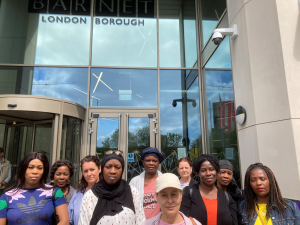
Update on Barnet 41 Kosher Catering Service workers.
Background:
The Kosher Kitchen Service was outsourced by Barnet Council in 2016 to ISS.
In 2021 and 2022, the Kosher Kitchen service, including staff, was TUPED to Signature Education.
On 1 March 2023 Signature Education TUPED the Kosher Kitchen service, including staff, to London Kosher Caterering.
The Kosher Kitchen Service used to provide a service for the following schools:
- Hasmonean Primary,
- Beis Yaakov Primary,
- Pardes House Primary,
- Menorah Primary,
- Sacks Morasha Primary,
- Rimon Primary,
- Mathilda Marks Kennedy,
- Beit Shvidler Primary,
- Nancy Reuben,
- Etz Chaim,
- IJDS,
- Menorah Foundation,
- Hasmonean High School MAT (2 schools),
- Kosher CPU.
When were the staff sacked?
Barnet UNISON is sad to report that the Kosher Kitchen catering service, after decades of providing school meals, was closed on Friday 5 May 2023.
At short notice 41 catering workers were asked to attend a meeting on that date when they were informed that the service was closing on the same day.
UNISON has been sent the HR1 form which sets out the details of redundancies.
The reason given for issuing redundancy is “insolvency.”
In response to this news Barnet UNISON has asked Barnet Council to take back the Kosher Kitchen service so that catering services to the schools can continue.
We have heard that many of the schools had no warning that the service would close, and no one knew who would be providing school meals the following week.
Our members are distraught as they had no idea that their jobs were at risk. All 41 staff were told to sign on as unemployed the following week.
In the meantime, Barnet UNISON has been arranging urgent meetings with our members.
Barnet UNISON is clear that the Kosher Kitchen service must remain open in Barnet.
“The One Barnet/Easy Council mass outsourcing policy has failed the Kosher Kitchen Service. It has failed to ensure schools provide meals for the children who relied on it. This is a service with a long tradition of providing kosher meals for pupils. Barnet Council must step up and save this service to ensure the pupils at the schools have a reliable excellent service going forward.” John Burgess, Branch Secretary, Barnet UNISON
End.
What does Barnet Council have to say about the request that the Council step in as the employer of last resort and ensure the children still receive school meals?
The Council states that it does not run Catering Services and that there are no statutory powers to ensure that the Council must deliver meals to schools.
Has Barnet Council ever intervened when services have failed?
Yes. See below.
- Council Housing repairs service
In 2010 Connaught went bust. They provided a council housing repair service. The workforce was sacked on the phone. UNISON asked for an intervention as all of the workforce were told they were sacked.
Barnet Council stepped in immediately, ensured meetings were set up with staff and speedily enabled another contractor to step in to employ the staff and ensure the services to residents continued.
- Home care services
Aquaflo, a Home Care provider, took over home care services and within weeks collapsed. Barnet Council stepped in and commissioned The Barnet Group to run the services.
- Resident and Day care services.
Fremantle (the contractor) said they could no longer run the residential and care service for older people. Barnet Council stepped in and commissioned The Barnet Group to run the services.
- Outreach Services
Genesis Housing said they would no longer continue to provide outreach services. Barnet Council stepped in and commissioned The Barnet Group to run this service.
- Education Services.
Global giant Mott Macdonald, who took on Education & Skills Services and the catering contract gave notice to Barnet Council that they wanted out of the contract.
Barnet Council stepped in and created a local authority trading company named Barnet Education and Learning Skills (BELS) to run Education & Skills services and directly contracted with ISS who had previously taken over the Catering services for Schools.
Capita Re.
Barnet Council made the correct decision to bring the Re contract to an early termination. The costs of bringing these services from Capita back is far greater than the Kosher Kitchen service. Until a political decision was made to run these services in-house the Council claimed they do not provide these services as they have a contractor.
Can schools choose who provides their school meals?
Yes, this has always been the case but when Kosher Kitchen service was run in-house the service was able to respond to the schools’ concerns and still ensure that hot meals were provided to the children.
The Kosher Kitchen Central Processing Unit facility is owned by Barnet Council and there is a long history of provision for Jewish Schools in Barnet. The in-house service built up an excellent reputation within Barnet Schools which enabled the Kosher Service to continue delivering hot meals.
What about the London Mayor’s pledge concerning Free School Meal provision?
It exposes the hard reality that unless there is an increase in funding the Kosher Service will not be viable. Food prices alone have increased by 20% but the funding for school meals has not increased.
This incident with the Kosher Kitchen service is likely to spread. The rising cost of food in what is the worst cost-of-living-crisis in 76 years is putting school meal provision in jeopardy.
More funding must be found for the Kosher Kitchen Service to be able to resume work for the start of the new term in September.
What is happening to the staff?
As from 5 May 2023 the staff have no money coming in. In a normal redundancy situation, there will be a consultation with staff and if the redundancy goes ahead the workforce will receive their redundancy pay and their notice pay.
In the current situation, as their employer became insolvent, employees had no warning and no notice pay.
This is the worst cost-of-living-crisis in 76 years and low paid workers are disproportionately impacted. This has had a devastating impact on these workers’ lives.
Staff must go online to claim their redundancy pay. This is proving difficult for many of the workforce, who are not familiar with completing online forms and do not necessarily have access to the appropriate facilities.
Furthermore, staff also must make a second online claim for a ‘protective award’. This is because they were given no notice of redundancy as their employer had been declared insolvent. This is yet another financial loss that these workers have to endure.
The claim for redundancy is further complicated because there are outstanding financial issues for this workforce unresolved before they were made redundant.
- Pension issues.
Many of the staff worked for Barnet Council and were in the Council Pension Scheme. We have discovered that two of the contractors have not paid Pension contributions into the scheme. This money is owed to the staff. Barnet Council is aware of this matter and has promised that it will support these workers. However, these workers need to know now what the Council is doing to get their money back. This is another financial loss that these workers have had to endure.
- Outstanding Pay issues.
Catering workers work term time only and therefore are paid using a term time pay formula.
Unfortunately, the term time formula they were being paid is incorrect. The incorrect formula they had in Barnet Council was continued with the TUPED contractors. This means they have been underpaid. This is another dispute that UNISON had taken up with ISS. The dispute has not been resolved. This is another financial loss that these workers have had to endure.
- London Living Wage
The staff were all employed on the London Living Wage. Barnet Council stated that any contractor delivering a service must pay the LLW. Unfortunately, we have now discovered that following the first TUPE the staff have remained on the LLW rate of £10.85 which was the rate for 2020/21. This is another financial loss that these workers have had to endure.
End.
Note to Journalists : Contact details: Barnet UNISON on or 020 8359 2088 or email: contactus@barnetunison.org.uk










